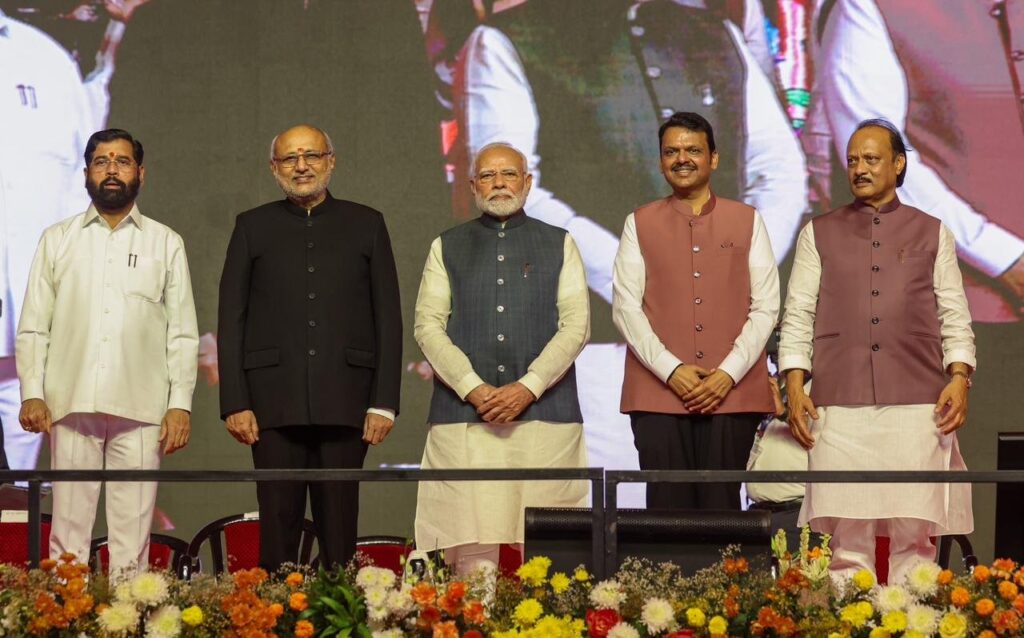
(From left) Eknath Shinde, C.P. Radhakrishnan,Governor of Maharashtra, Narendra Modi, Devendra Fadnavis, and Ajit Pawar at the oath-taking ceremony on December 5
The crushing defeat of the MVA in the Maharashtra Assembly elections has opened up many possibilities as well as questions about the future of regional strongmen like Uddhav Thackeray and Sharad Pawar and of coalition politics in the state. The biggest question, however, is how long the MVA will last even as murmurs of discontent within the INDIA bloc gather steam
The almost two weeks it took for Devendra Fadnavis to be sworn in as chief minister and the long-drawn process of cabinet formation despite the BJP’s landslide victory in the Assembly elections underline the multiple challenges of power sharing confronting the Mahayuti government in Maharashtra. On the other hand, after the drubbing at the hustings, regional satraps like Uddhav Thackeray and Sharad Pawar need to reinvent their politics in order to stay relevant in their home state.
Fadnavis will have to do a delicate balancing act for maintaining a harmonious relationship with Eknath Shinde’s Shiv Sena, as the Thackeray-led Shiv Sena (UBT) [Shiv Sena (Uddhav Balasaheb Thackeray)] will be ready to exploit any rift in ties following the serious losses in the elections. The bigger question, however, is how long the Maha Vikas Aghani (MVA), the alliance between a marginalised Pawar’s Nationalist Congress Party Sharadchand Pawar (NCP-SP), the Congress and Shiv Sena (UBT) will last.
Pawar will try his best to maintain the alliance, but Thackeray is now determined to return to the old ways of Hindutva. His
party’s furious reaction to the Railways’ notice to demolish an allegedly illegal
temple at the Dadar railway station premises was the first indication of this.
Thackeray then met Fadnavis and went on to question the BJP’s commitment towards honouring Vinayak Damodar (Veer) Savarkar, one of Hindutva’s biggest icons, in a media interaction. “While I was the chief minister, I wrote
Pawar will try his best to maintain the alliance, but Thackeray is now determined to return to the old ways of Hindutva. His party’s furious reaction to the Railways’ notice to demolish an allegedly illegal temple at the Dadar railway station premises was the first indication of this
to Prime Minister Modi to give the Bharat Ratna to Savarkar, but this demand has not been considered till date. Therefore, the BJP has no right to talk about Savarkar,” said Thackeray. What is interesting is that Thackeray’s comments came right after the Leader of Opposition, Rahul Gandhi, attacked Savarkar in Parliament during discussions marking 75 years of the adoption of India’s guiding document for the latter’s “there is nothing Indian about our Constitution” comment and for writing mercy petitions to the British authorities seeking clemency.
Even before the Maharashtra elections, Thackeray’s proxies had been questioning the Congress’ ability to win elections in a
direct contest against the BJP after the party suffered defeat in Haryana. “Congress needs to introspect why they lose whenever there is a direct contest,” said Priyanka Chaturvedi, Shiv Sena (UBT) Rajya Sabha member. Another Shiv Sena (UBT) leader, Ambadas Danve, blamed the Congress for the defeat of the MVA in the state elections.
“Congress’ overconfidence is responsible for this…everyone wanted to be the chief
minister. Now we will have to decide the
future course of action and strengthen the
party in all the 288 seats in the state,” said
Danve. Some leaders believe that the party’s departure from its core Hindutva agenda
for courting Muslim voters cost them power. As a result, the Shiv Sena led by Shinde managed to corner a lion’s share of Hindu and Maratha votes, which is the core base of both factions.
Shinde, taking a dig at Thackeray’s subtle shift back to Hindutva issues, commented, “This is a remarkable change. These are the same people who threatened to jail the leaders of Mahayuti a few days ago.” There are indications the Shiv Sena (UBT) will contest the Brihanmumbai Municipal Corporation (BMC) elections on its own. The BMC elections are crucial for the party; it has held the body since 1996 after coming to power in Maharashtra in 1995 with the BJP. Since then, all 12 mayors of the BMC have belonged to the Shiv Sena (UBT). The BMC has always been a Shiv Sena stronghold and a defeat in the BMC elections could portend a bleak political future for Thackeray. But it remains to be seen whether the Shiv Sena (UBT) can defend its fortress, going it alone in the
BMC elections, especially since Shinde has successfully managed to project himself as the true inheritor of Balasaheb Thackeray’s political legacy and ideology after securing 57 Assembly seats.
If Thackeray breaks away from the MVA, it will spell the end of the alliance.
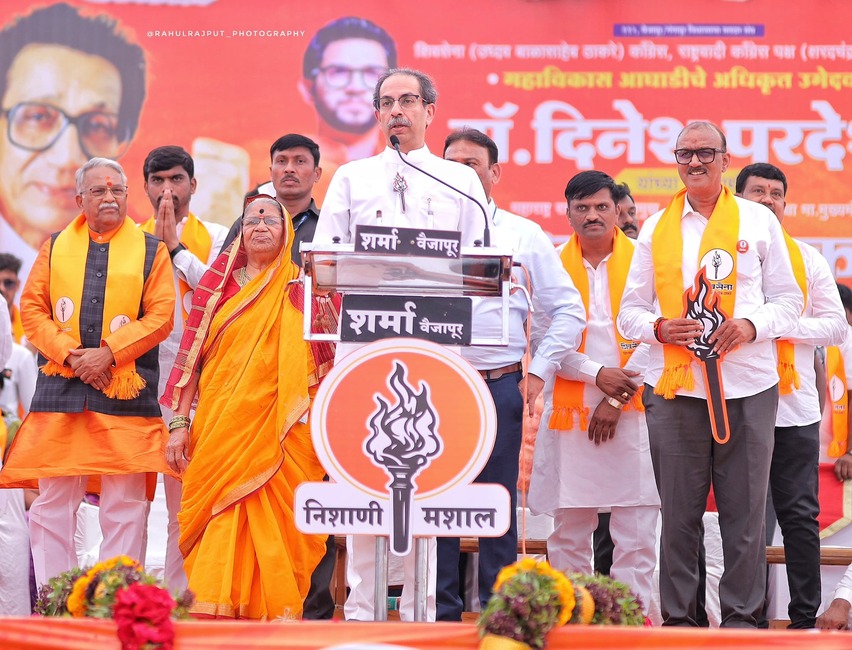
Uddhav Thackeray is under pressure from his party colleagues to clearly define the outfit’s political ideology going into future elections
in-charge, Abu Azmi, has already announced a breaking away from the alliance after the Shiv Sena (UBT) praised the Babri Masjid demolition by issuing advertisements in newspapers. The
Congress, which won only 16 of 101 seats it contested in the Assembly elections, seems
Pawar is not only the architect of the MVA, he also played a crucial role in stitching the INDIA coalition. But, at 83, his political activism is slowly waning. Besides, the NCP-SP at best is a regional power, which draws its political capital from Western Maharashtra
to be in a helpless position. It cannot hope to survive in the MVA solely on the basis of its core Muslim voters, especially when Thackeray is hinting at leaning into his party’s original Hindutva ideology. However, for the moment, he has to keep Sharad Pawar on his side for lack of better options. MVA architect Sharad Pawar has been in politics for more than 60 years. Though a regional satrap, he wields oversized influence over politics in Delhi. He is not only the architect of the MVA, he also played a crucial role in stitching the INDIA coalition. But, at 83, his political activism is slowly waning. Besides, the NCP-SP at best is a regional power, which draws its political capital from Western Maharashtra, and Pawar is perceived as a strong farmer leader. He and his party might try to keep the focus on agricultural crisis, droughts, and farmer suicides, but these issues do not resonate in urban centres. These internal con tradictions will make it increasingly difficult for even Pawar, who has a knack for striking the unlikeliest of alliances, to keep the MVA together.
The challenges Fadnavis faces are no less. He will need to draw on all his political acumen to maintain the fragile stability of the coalition with Shinde and Ajit Pawar besides balancing the social welfare schemes—especially Laadli Behna that were announced by the BJP during the campaign leading up to the polls, and economic development, which will eventually determine the success or failure of his government. Shinde has already proved to be a tough alliance partner, and any clash with him or Ajit Pawar will destabilise the government. It won’t be surprising if both Thackeray and Sharad Pawar try to exploit the existing fault lines in the Mahayuti to destabilise Fadnavis’ chief ministership.
With the BJP faring strongly in the Assembly elections, Thackeray and Pawar have limited leverage over Fadnavis. As the senior Pawar is starting to fade away, estranged nephew Ajit, who broke up the party, will try his best to assert himself as the true inheritor of the Maratha mantle.
If Ajit uses his political skills wisely, he can take the NCP in a different direction, but before that he has to deal with senior leaders and local strongmen like Chhagan Bhujbal, who is not very pleased at not being made a minister. Overall, after the 2024 Maharashtra Assembly election results, the state’s politics is entering a very interesting phase, which will have a serious bearing on the career trajectories of regional political heavyweights.
Meanwhile, the BJP can build on its base for becoming the undisputed power centre in Maharashtra politics.
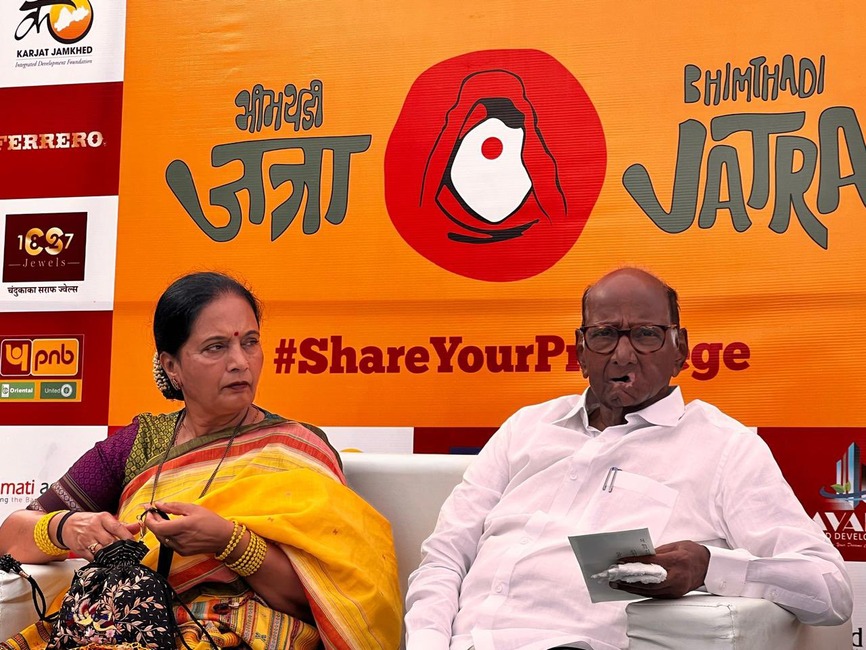
After the Maharashtra Assembly election defeat, a cloud of uncertainty hovers above the 60-year-old political career of Sharad Pawar
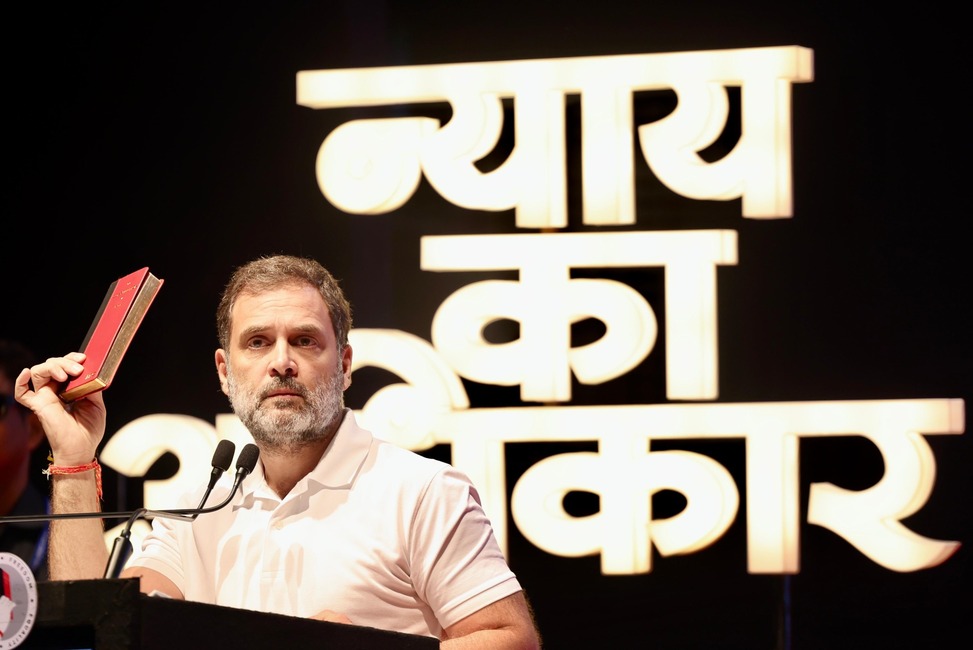
Post-polls, the Congress’ political relevance is further reduced in the state


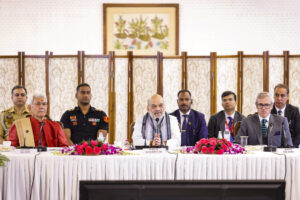
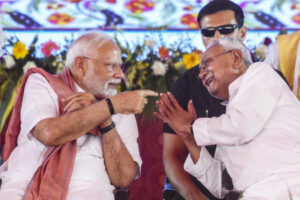
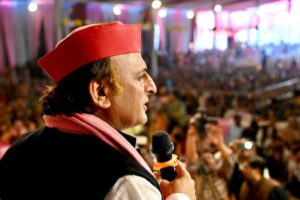
Add Comment